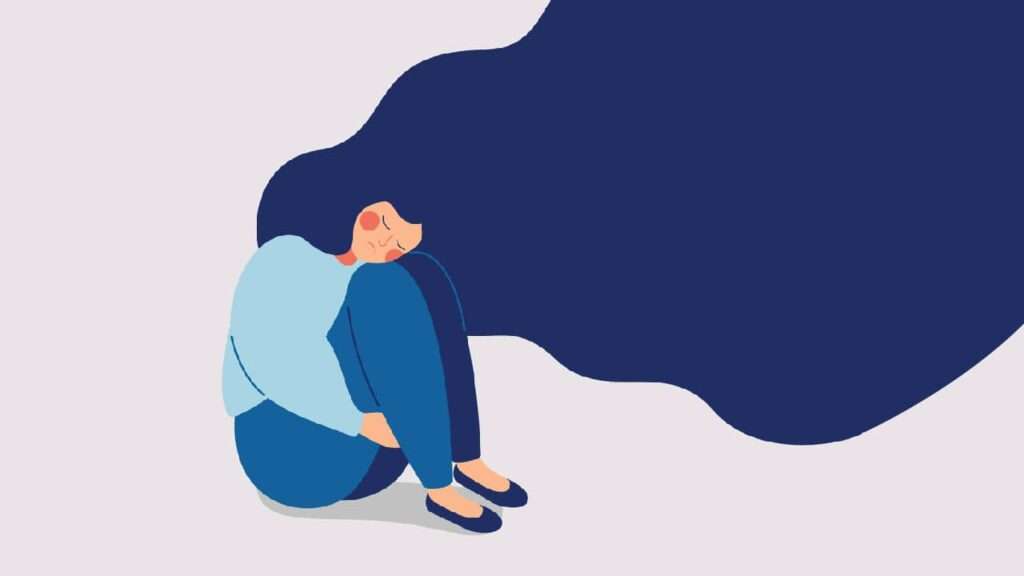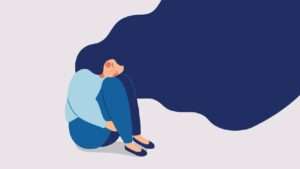PMDD causes tremendous physical and emotional suffering and you must consider expert help. Good news – it can be effectively managed in natural ways.

While most women experience irritability, racing thoughts, emotional breakdowns, acne breakouts and anxious thoughts before periods, through their reproductive lives – some more unfortunate of us have to bear with a highly discomforting and emotionally disturbing disorder associated with menses – called as premenstrual dysphoric syndrome (PMDD).
In a survey an estimated 90% of females in their 20’s-30’s deal with such stressful symptoms, a week to ten days before their periods. For some, it’s limited to behavioral changes which they can manage, but for others it becomes intolerable.
Feeling nauseated, vomiting, abdominal bloating, tossing on your bed struggling to sleep, unwillingness to talk to anyone and even having depressive and suicidal thoughts around a week prior to your periods, are common when you suffer from PMS. While PMS is a common syndrome, PMDD is a severe form of PMS in which these symptoms can be debilitating and force your daily functioning to come to a grinding halt.
PMS VS PMDD – Similarities and differences
Both these conditions have many symptoms in common e.g.
- Feeling emotional
- Nervousness
- Anger
- Sense of weight gain
- Bloating
- Acne
- Irritability
- Tender breasts ‘
- Increased appetite
- Uptake in fights
- Headache
However, the difference lies in the severity of these symptoms and how badly these symptoms are affecting your life.
Mood Swings
In the case of PMDD, your mood seems like a leaf in the wind. You feel emotionally weak and low. You may become very angry and bother about everything happening around you. You may cry and worry about things that normally won’t affect you. You become too sensitive to rejection and feel like you have lost control in your life.
Bloating and weight gain
Due to changes in sex hormones (estrogen, progesterone), there is more water retention in the body making you feel bloated and sometimes like a water balloon being pushed to work.
Depression
You may feel low if you have PMS but in the case of PMDD, you tend to isolate yourself socially and have continuous interpersonal problems. PMDD may lead to severe depression and in some cases might bring suicidal or violent thoughts about yourself and others.
If these symptoms are due to PMDD, they usually subside on their own with the onset of your periods. Yet, the weeks leading up to the period can be nightmarish. It is important to remember that these thoughts and behaviors are not due to any fault of your own. Therefore, it is important to not blame yourself or anyone else for these symptoms and seek professional help.
Causes Of PMDD
The Contemporary signs define PMS & PMDD as idiopathic (without any cause) but some recent studies have shown a drop in serotonin levels and dopamine (in some cases) which control our mood and emotions might be a possible cause.
These hormonal changes take place in every woman. However, some are more sensitive to these changes leading to severe symptoms.
The Ayurvedic Insights
Ayurveda explains the menstrual cycle as “Rituchakra” which comprises of three stages.
- Rajakala/Menstrual Phase or Bleeding phase:- During this time the Artava or menstrual bloodsheds and is mainly ruled by vata dosha as a ‘apana vayu’ does the function of providing motion and bringing blood out of your body.
- Ritukala/ Ovulation Phase:- Herein you stay happy, strong and confident with clear skin and it is mainly marked by Kapha predominance.
- Rituvyatita Kala/ Luteal Phase:- A week to ten days before periods when you feel PMS or PMDD symptoms and this phase is dominated mainly by pitta dosha.
This pitta dosha gets vitiated causing problems such as anger issues, irritability, tender breasts and acne. If there is a combination of Pitta and Vata you are likely to experience insomnia, confusion, cramps, headache and backache.
The vata dosha is the main culprit here as Vata provides movement to the other two doshas. So the Vata dosha imbalance causes an imbalance state of other two doshas leading to this trouble 10 days before your periods.
In association with the doshas, the vata also influences the channels responsible for carrying the first vita dhatu or the Rasa of your body thereby leading to weakness, fatigue and further causing vomiting and bloating. Along with influencing your body dosha Vata troubles your manas(mind) by vitiating mano dosha thereby making you feel emotionally weak and anxious before your periods. Therefore the treatment is centered around calming your vata and bringing it back to its seat creating harmony and balance in your body.
Causes of PMDD According to Ayurveda
Ayurveda believes in the unification and wholesomeness of the body. The disease pertaining to the reproductive system (PMDD) is not strictly centered around that particular system but is a manifestation of your whole body. Therefore everything you put inside your body, be it the food for body or mind affects the overall health. Here are some underlying causes for PMDD
- Intake of excessive salty, hot, spicy, junk food.
- Genetic /Family history.
- Lack of exercises or physical movements
- Working out more than your capacity
- No dinacharya or daily routine.
- General anxiety/stress and sustained feeling of lack of control in life.
- Expecting too much of oneself and lack of rewards.
- Blockages in circulation, a buildup of toxins and impurities.
The natural management of the condition in ayurveda consists of maintaining an equilibrium during the most sensitive period of menstruation.
Diet Guidelines
- In a case study, it was found that food changes are powerful enough to keep symptoms at a bay.
- Balance diet:- Keep a balance of fibers, proteins, carbohydrates in your diet along with that eat foods which are soothing in nature.
- Use of grains such as rakta shali , rice, yava (barley), Chapatti(wheat), Dalia.
- Avoid ushna, tikshana, vidahi aahara (fast foods, deep-fried, packaged items like chips etc)
- Talk to an ayurvedic expert to know the best foods for your body type.
Lifestyle and Yoga
Specific yoga postures and breathing techniques Sheetali & Bhramari pranayama make you feel cool and confident. The movement through aerobic activity helps remove obstructions in your circulation.
In addition to these simple tiny things such as massaging feet or getting massage treatments with warm oils, pleasant music and pacifying aromas help to balance moods. A yoga expert should be consulted in order to identify specific asanas and pranayama which are most suited for your present state of health.
The Ayurvedic treatment protocol
In order to take care of PMDD and menstrual issues, the ayurvedic treatment focuses on bringing back the body’s balance and restoring health. It becomes important to understand the individual’s body type and diagnose what exactly is happening within your body. The ayurvedic treatment plan is designed for
Removing the blockages in circulation and making the body free of the accumulated toxins.
Bringing the ‘agni’ or digestive fire in the normal state for restoring the metabolism of the body.
Improving the nutritional state by facilitating better absorption of nutrients.
Calming the mind and supporting the nervous system.
Rejuvenation and providing strength to the body to make it heal naturally.
These simple sounding outcomes might still be difficult to achieve without the constant guidance and support of a team of experts, due to the extremely disturbing nature of the symptoms.
For these reasons, at VedaWiser, we also provide a 12 week guided online program for managing PMDD naturally. Throughout these 12 weeks, you will be closely guided by a team of experts including our ayurvedic expert, yoga expert and a trained consultant who will provide you curative holistic healing. All the consultations, yoga sessions and conversations are provided over video calls.
Why consider the ayurvedic line of treatment?
Oral Contraceptive Pills (OCP’s), Over-The-Counter Painkillers (OTC) & anti-depressants, which are commonly used in the treatment in modern medicine, might provide temporary relief to PMDD symptoms but don’t offer a permanent cure.
These medications may cause side-effects. According to an article published in British Medical Journal, there are significant side effects, including an elevated risk of heart attack therefore one should avoid taking them unless the pain is not tolerable. OCPs are infamous for their adverse effects on reproductive health.
For these reasons, it is worth considering to supplement (or completely replace) this line of treatment with a combination of ayurvedic and yogic interventions which can managed PMDD to a large extent, naturally. With the help of right experts you will develop a regime of diets, routine, yogic interventions including asanas, pranayama and meditative techniques which are sure to reduce your dependence on pills.
FAQs
Symptoms of PMDD can worsen during the late 40’s especially during years of perimenopause. The behavior and physical symptoms might become difficult to manage due to increased unpredictability and irregularities in periods.
You should avoid acidic food items and processed foods as much as possible. Avoid salt and high sodium food items. It’s best to leave caffeine and alcohol.
You should eat plenty of fresh fruits and vegetables and eat according to hunger not as per the clock.
Recent studies have shown that fluctuation in hormones and especially fall in progesterone before periods can cause water retention and temporary gain in weight which might subside after periods. The increased appetite and missing workouts can be a contributing causes.
Mood swings before periods and feeling bloated can resolve on it’s own but PMDD being a severe condition that interferes with normal daily activities having both physical and emotional disturbances requires treatment.
PMDD is an endocrine system-related disorder since hormonal changes play an important role in its symptoms. These symptoms appear a week to 10 days before periods and go away after periods. These symptoms can also be physical (loose stools, vomiting, breast tenderness) and behavioral such as anxiety and depression hence it requires the right therapy and treatment support.

